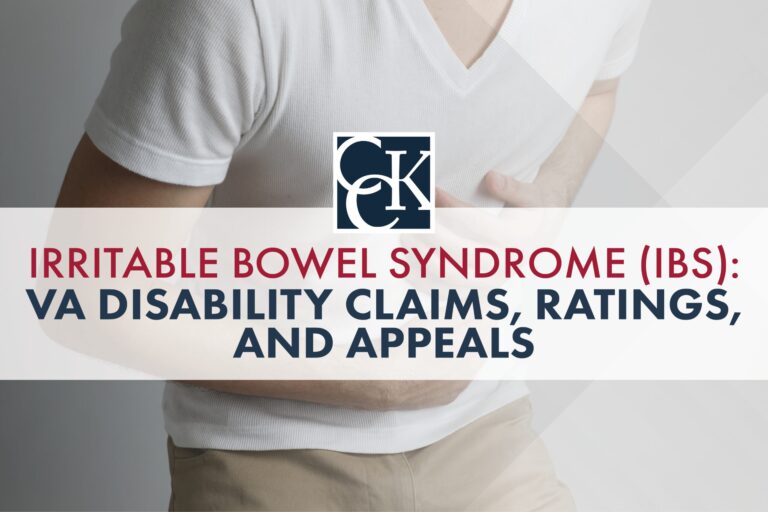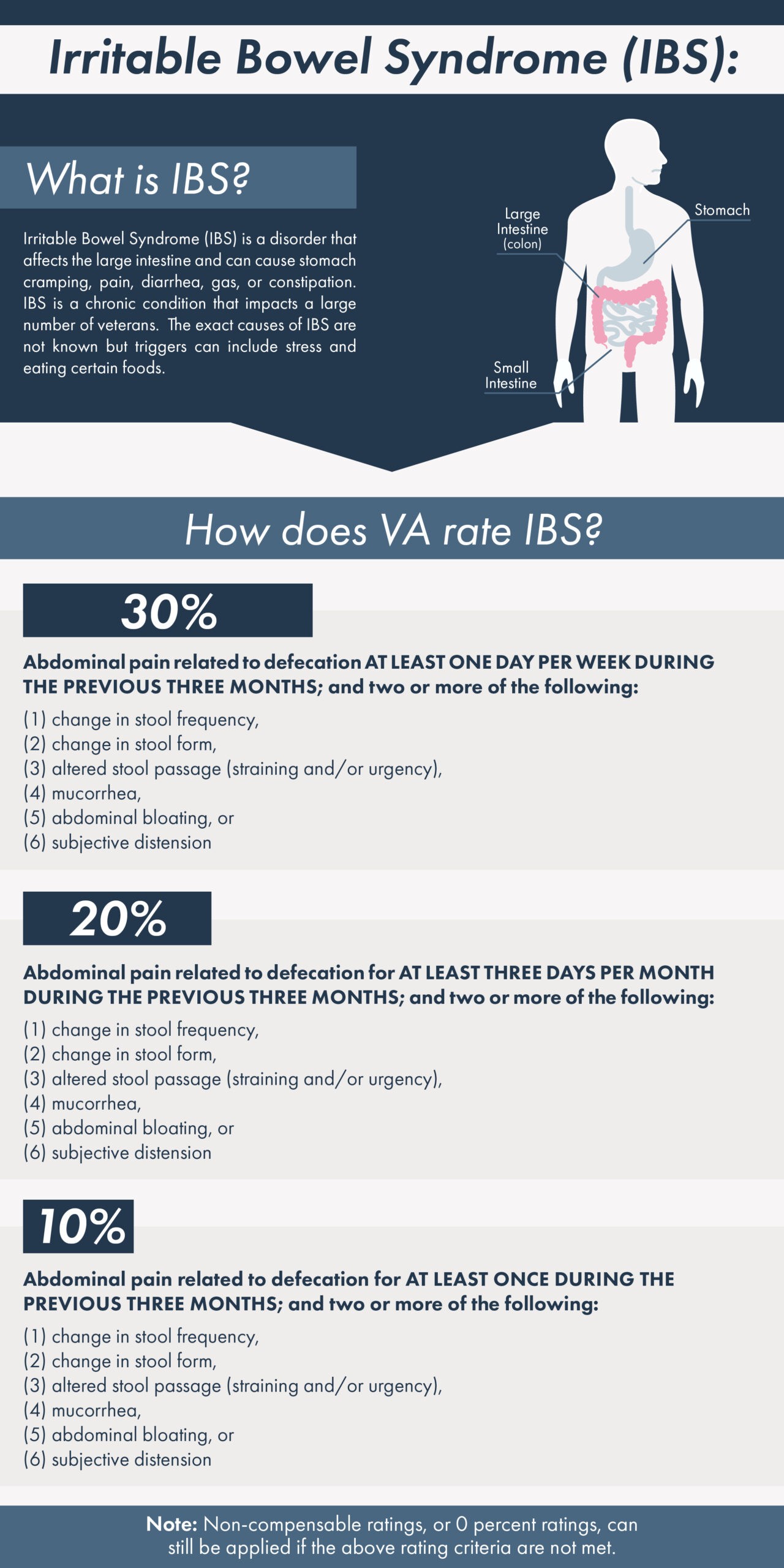Irritable Bowel Syndrome (IBS): VA Disability Claims, Ratings, and Appeals

CCK Law: Our Vital Role in Veterans Law
Irritable bowel syndrome (IBS) is a highly prevalent service-connected disability among veterans. According to VA’s most recent Annual Benefits Report, over 230,000 veterans are receiving benefits for IBS.
IBS is an intestinal disorder. Its primary symptoms include abdominal pain, bloating, diarrhea, and constipation. Unfortunately, there is no definitive test available to diagnose this condition, and treatment focuses on alleviating the symptoms.
In 2024, VA updated the ratings for all digestive-system-related conditions, including for IBS, which uses diagnostic code 7319. This article will describe ratings available for irritable bowel syndrome, tips for proving service connection for IBS, and other special considerations.
VA Ratings and Benefits for Irritable Bowel Syndrome
The Department of Veterans Affairs (VA) rates irritable bowel syndrome under 38 CFR § 4.114, diagnostic code 7319. Before the 2024 changes, the condition was known as “irritable colon syndrome.”

VA disability ratings for IBS range from 0 to 10 to 30 percent—depending on the severity of symptoms.
The new criteria for each VA IBS rating is as follows:
- 10 percent — A veteran receives a 10 percent rating if they experience abdominal pain at least once a month during the previous three months, associated with defecation. They must also experience two or more of the following symptoms:
- Stool frequency change
- Stool form change
- Straining and/or urgency (i.e., stool passage alteration)
- Mucorrhea
- Abdominal bloating
- Subjective distension
- 20 percent — A veteran receives a 20 percent rating for IBS if they experience abdominal pain associated with defecation; this pain must occur at least three times per month for the previous three months. Veterans must also experience two or more of the following symptoms:
- Stool frequency change
- Stool form change
- Straining and/or urgency (i.e., stool passage alteration)
- Mucorrhea
- Abdominal bloating
- Subjective distension
- 30 percent — VA assigns veterans 30 percent ratings, the highest rating for IBS, if they exhibit severe symptoms. Specifically, the veteran must have abdominal pain associated with defecation on at least one day per week during the previous three months. They must also experience two or more of the following symptoms:
- Stool frequency change
- Stool form change
- Straining and/or urgency (i.e., stool passage alteration)
- Mucorrhea
- Abdominal bloating
- Subjective distension
Note: Diagnostic code 7319 may also include functional digestive disorders. Examples include dyspepsia, functional bloating and constipation, and diarrhea.
Establishing Service Connection for IBS
To receive VA disability benefits for IBS, veterans must first establish service connection using one of the methods below.
Direct Service Connection for Irritable Bowel Syndrome
To establish direct service connection for irritable bowel syndrome, the veteran must provide proof of the following:
- A current, diagnosed condition, and
- An in-service event, injury, or illness, and
- A medical nexus linking the condition to the event.
Veterans can submit a claim for VA disability benefits with VA Form 21-526EZ. Claims should be submitted as soon as possible to set the “effective date” from which compensation will be calculated.

Veterans then have one year to collect as much supporting information as possible: e.g., doctor and hospital reports, test results, nexus letters, and lay evidence (see below).
VA may then request a Compensation & Pension (C&P) Exam to determine how to rate the veteran’s disability. See the “C&P Exam” section below for more details.
Is IBS a Presumptive Condition for Service Connection?
IBS is considered a medically unexplained chronic multisymptom illness, or MUCMI. 38 U.S.C. § 1117 and 38 C.F.R. § 3.317 authorize presumptive service connection for MUCMIs for Persian Gulf War veterans.
This means that VA may presume service connection for a Persian Gulf War veteran with irritable bowel syndrome, provided the veteran meets certain requirements.
Secondary Service Connection for IBS
A secondary service-connected disability is a new condition caused by an existing service-connected disability.
If a veteran developed IBS as a result of another service-connected condition, such as post-traumatic stress disorder (PTSD), they may qualify for disability benefits based on secondary service connection. To establish secondary service connection for IBS, veterans typically need to submit:
- A diagnosis of secondary IBS by a medical professional; and
- Medical evidence (i.e., a nexus) linking the service-connected condition to the secondary IBS.
Secondary disabilities can be especially challenging to prove. If you need assistance, contact CCK for a free case evaluation.
Lay evidence is often overlooked as a way to prove service connection. These are personal statements written by someone familiar with the veteran’s situation. There are several types of lay statements. VA uses C&P exams to gather more evidence on a veteran’s claimed condition before issuing a decision and assigning a rating. Before the exam, the examiner will review a veteran’s entire claims file. The exam itself usually lasts about 15-20 minutes but can range anywhere from five minutes to several hours. Veterans are urged to prepare as much as possible. Total Disability based on Individual Unemployability (TDIU) allows veterans to be compensated at VA’s 100 percent disability rate when their conditions prevent them from holding “substantially gainful” employment. Irritable bowel syndrome alone cannot qualify a veteran for schedular TDIU benefits. However, it may help qualify a veteran for combined schedular TDIU or extraschedular TDIU benefits. TDIU is a highly complex and challenging area of veterans law. Contact CCK for a case evaluation. There are various circumstances in which you may wish to revisit or appeal your claim. For example: In situations like these, you do have options for appealing your rating. Appeals can be difficult and time-sensitive. Also, veterans have likely already experienced lengthy delays waiting for their initial rating. Therefore, the law permits veterans to hire a VA-accredited law firm or advocate to assist with appeals. For a free case evaluation from CCK, the leading and most experienced veterans law firm in the U.S., please call 401-251-0659 or contact us online.Other Considerations for Irritable Bowel Syndrome VA Disability Claims
How Lay Evidence Can Help a Claim
What to Expect at a C&P Exam for IBS

How to Get TDIU for Irritable Bowel Syndrome
How to Appeal or Increase Your VA Rating
Call CCK Today
About the Author
Share this Post

